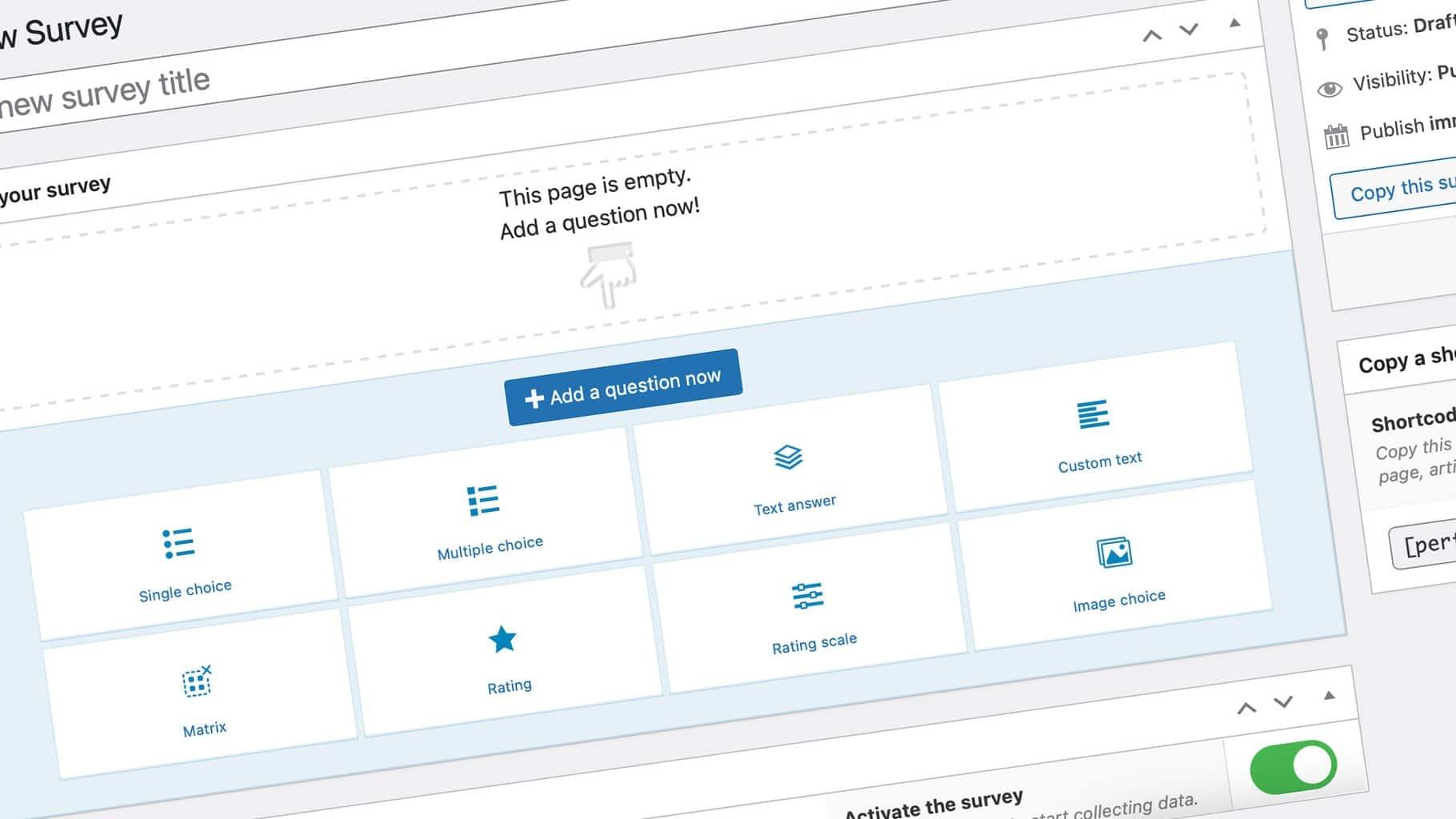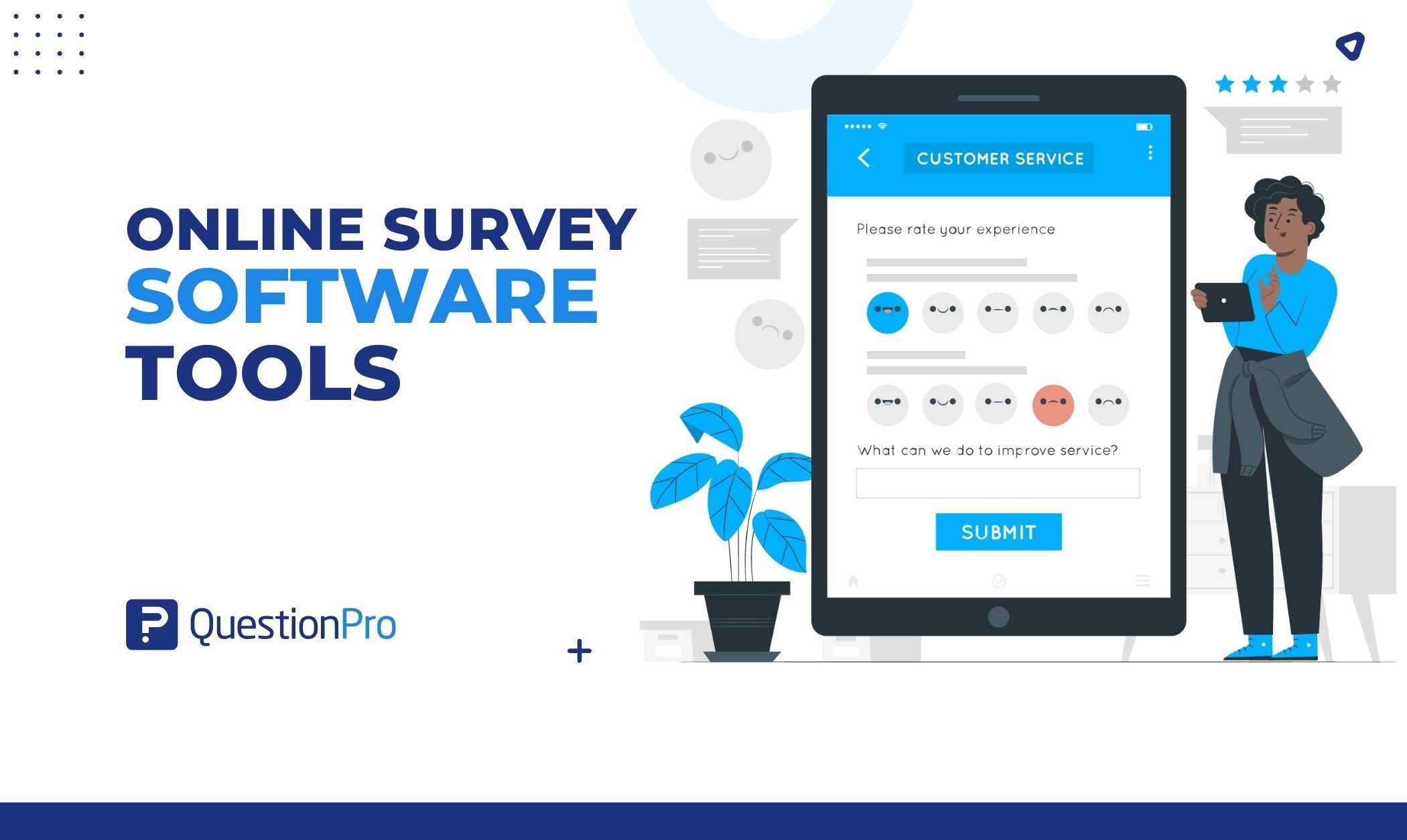Are you looking too engage your audience and gather invaluable insights directly from your website? if so, harnessing the power of surveys is a fantastic way to do just that! In today’s digital landscape, understanding your visitors’ thoughts, preferences, and feedback can set you apart from the competition and drive your growth. But how do you choose the right tool to create those surveys? Enter WordPress survey plugins, your secret weapon for collecting data with ease and efficiency.
in this article, we’ll dive into the best WordPress survey plugins available, comparing their features, ease of use, and pricing. Whether you’re a seasoned site owner or just starting, we’ll help you navigate the options to find the perfect plugin tailored to your needs. Let’s explore how these tools can transform your website into an interactive platform where every visitor’s voice matters!
Unveiling the Power of WordPress Survey Plugins
When it comes to gathering insights and feedback, WordPress survey plugins are a game changer. These tools not only enhance user engagement but also provide valuable data that can help steer your content strategy, product growth, and customer satisfaction efforts.With an array of options available, you can easily find a plugin that suits your specific needs, whether you’re looking to conduct fast polls or more complete surveys.
One of the standout features of these plugins is their customization capabilities. You can tailor your surveys to reflect your brand’s identity by adjusting colors, fonts, and layouts. This ensures that your surveys not only serve a functional purpose but also align visually with your website.Some plugins even allow for advanced logic, meaning you can create dynamic surveys that adapt based on a user’s previous answers, providing a personalized experience.
| Plugin Name | Key Feature | Best For |
|---|---|---|
| WPForms | drag-and-drop builder | Easy setup |
| Gravity forms | Advanced conditional logic | Complex surveys |
| SurveyMonkey | Integration with third-party tools | Comprehensive data analysis |
Another compelling advantage of utilizing survey plugins is the real-time analytics they offer. Most plugins come equipped with robust reporting tools that visualize your data through charts and graphs, allowing you to quickly interpret the results. You can monitor responses as they come in, making it easier to pivot your strategies based on immediate feedback from your audience.
Moreover, many of these plugins are optimized for mobile devices, ensuring that your surveys are accessible to users on any platform. With the increasing use of smartphones, this feature is essential for maximizing participation rates. When users can easily respond to your surveys on their mobile devices, you increase the likelihood of obtaining a larger, more diverse set of responses.
consider the integration options that many WordPress survey plugins provide. Connecting your surveys to email marketing platforms, CRM systems, or social media accounts means you can streamline your data collection process and enhance your marketing efforts. By leveraging these integrations, you can create a cohesive ecosystem where feedback leads to actionable insights, all while saving you valuable time.

Why Surveys Matter for Your Website Engagement
Surveys are more than just a method of collecting data; they are a powerful tool for enhancing user engagement on your website. By implementing surveys, you invite your audience to share their opinions, preferences, and feedback, creating a two-way conversation that fosters a sense of community.
When users feel heard, they are more likely to return to your site and engage with your content. This feedback loop not only improves your offerings but also helps you understand your audience better. Here are some compelling reasons why you should consider integrating surveys into your website:
- boost User Interaction: Surveys encourage visitors to interact with your site beyond just browsing. This engagement can lead to longer time spent on your website and lower bounce rates.
- Gain Valuable Insights: Understanding your audience’s preferences and pain points through surveys allows you to tailor your content and services accordingly, making your website more relevant and user-kind.
- Enhance User Experience: By asking your audience what they want, you can make informed changes that enhance their experience, leading to higher satisfaction and loyalty.
- Encourage Participation: Incentivizing survey completion through discounts or entry into contests can lead to increased participation, providing you with richer data.
Incorporating well-designed surveys can provide a wealth of insights that can drive your marketing strategies and content creation. Imagine being able to segment your audience based on their responses, allowing for personalized content delivery that resonates deeply with each group.
| Survey Type | Benefits |
|---|---|
| Customer Feedback | Understand user satisfaction and areas for improvement |
| Product Development | Gather insights for new features or products |
| Market Research | Identify trends and customer preferences |
| Event Planning | Collect opinions on potential topics or speakers |
don’t underestimate the impact of user feedback. By integrating surveys, you eliminate guesswork, allowing you to make data-driven decisions that propel your website’s success. The right WordPress survey plugin can definitely help you streamline this process, making it easy to create and analyze surveys without extensive technical knowledge.
Ultimately, your ability to engage users and adapt to their needs can set your website apart in a crowded digital landscape. Surveys allow you to build that bridge, transforming passive visitors into active participants in your brand’s journey.
Key Features to Look for in Survey Plugins
when searching for the ideal survey plugin for your WordPress site, it’s crucial to consider several key features that can greatly enhance your survey experience. These features not only dictate the functionality of the plugin but also play a pivotal role in how effectively you can gather and analyze data from your audience.
- User-Friendly Interface: A plugin should boast an intuitive interface that allows you to create surveys without needing extensive technical knowledge. Look for drag-and-drop functionalities that streamline the survey-building process.
- Customizable Templates: The ability to customize survey templates can substantially enhance engagement. Choose a plugin that offers a variety of pre-designed templates or allows you to create your own from scratch, ensuring your survey aligns with your brand’s aesthetic.
- Responsive Design: With many users accessing surveys via mobile devices, it’s essential that the plugin you choose is mobile-responsive. This ensures that your surveys display correctly on all screen sizes, providing a seamless experience for all users.
Moreover,consider the question types available. A versatile plugin should support a variety of question formats, such as multiple choice, rating scales, and open-ended questions. This diversity allows you to tailor your surveys to gather the most relevant data.
| Feature | Importance |
|---|---|
| Analytics & Reporting | Essential for understanding responses and improving future surveys. |
| Integration capabilities | Allows for seamless data flow between your surveys and other tools (like CRM and email marketing). |
| Security & Privacy | Crucial for protecting user data and complying with regulations. |
- Analytics & Reporting: An effective survey plugin should provide detailed analytics and reporting features. This allows you to easily interpret the collected data, identify trends, and make informed decisions based on your findings.
- Integration Capabilities: Look for plugins that integrate smoothly with other tools you already use,like CRM systems,email marketing services,or social media platforms. This not only saves time but also enhances the overall functionality of your surveys.
- Security & Privacy: Ensuring the privacy of your respondents is paramount. Choose a plugin that adheres to security standards and complies with regulations like GDPR,giving your users confidence that their data is safe.

A Closer Look at the Top WordPress Survey Plugins
When it comes to gathering insights and feedback from your audience, choosing the right survey plugin can make all the difference. Let’s dive into some of the top WordPress survey plugins that can elevate your data collection game.
1. WPForms
WPForms isn’t just a form builder; it’s a powerful survey tool that allows you to create highly customizable surveys with ease. With its drag-and-drop interface, you can:
- Quickly build forms without any coding knowledge.
- Utilize pre-built survey templates for faster setup.
- View real-time survey results with a simple dashboard.
This plugin integrates seamlessly with email marketing services and payment gateways, making it versatile for various needs.
2. SurveyMonkey
For those looking for advanced survey features, SurveyMonkey is a standout choice. This plugin offers:
- A wide array of question types, including multiple choice and open-ended questions.
- Robust analytics tools to analyze and visualize your data.
- Custom branding options to align surveys with your website’s theme.
While it offers powerful features, it can be a bit pricier as you upgrade to higher plans.
3.Formidable forms
Formidable Forms takes surveys to the next level with its advanced features. It allows you to:
- Create multi-page surveys for a more structured approach.
- Use conditional logic to show questions based on previous answers.
- Display results in charts and graphs directly on your site.
This plugin is perfect for users who want a professional-looking survey with minimal effort.
| Plugin | Key Features | Best For |
|---|---|---|
| WPForms | Drag-and-drop builder, pre-built templates | Beginners and small businesses |
| SurveyMonkey | Advanced analytics, custom branding | large organizations needing in-depth feedback |
| Formidable Forms | Multi-page surveys, conditional logic | Professionals wanting detailed insights |
Each of these plugins offers unique features tailored to different needs. WPForms shines for its user-friendliness, SurveyMonkey excels in analytics, and Formidable Forms stands out for its conditionally-designed surveys. Depending on your requirements and budget, any of these tools could be the perfect fit for engaging your audience and gathering actionable feedback.

Comparing User-Friendly Interfaces of Survey Tools
When it comes to survey tools, the user interface (UI) can make or break your experience. A well-designed UI not only enhances usability but also encourages higher response rates from participants. Let’s dive into how various WordPress survey plugins stack up against each other in terms of user-friendliness.
Intuitive Dashboards
An intuitive dashboard can significantly streamline the process of creating and managing surveys. Look for plugins that feature:
- Drag-and-drop functionality for easy question placement
- Clear navigation menus that guide you through the survey design process
- Preview options to instantly see how your survey will appear to respondents
Plugins like WPForms and Formidable Forms shine in this area, offering clean, accessible dashboards that even beginners can navigate effortlessly.
Customization Options
Customizing your survey’s appearance is crucial for branding and engagement. The best plugins provide:
- flexible design tools for colors, fonts, and layouts
- Pre-built templates that you can modify to fit your needs
- Mobile-responsive designs to ensure surveys look great on all devices
For instance, while Typeform allows for extensive customization, plugins like SurveyMonkey offer a more limited range but are incredibly straightforward, making them ideal for quick surveys.
Question Variety
The ability to ask different types of questions can enhance the quality of your data. A user-friendly plugin will typically support:
- Multiple-choice questions for quick answers
- Open-ended questions for detailed feedback
- Rating scales to gauge satisfaction levels
Some plugins, such as Gravity Forms, provide a vast array of question types, which can be particularly useful for nuanced qualitative data.
Response Collection & Reporting
Simplifying response collection and reporting is essential for efficient data analysis.The best survey plugins feature:
- Real-time response tracking to monitor participation
- Data export options for easy analysis (CSV, Excel, etc.)
- Visual reporting tools that summarize findings at a glance
Plugins like WPForms excel in this area, offering user-friendly reporting interfaces that make it easy to draw insights from your data without the headache of complicated analytics.
| Plugin | User Interface Score | Customization options | response Analytics |
|---|---|---|---|
| wpforms | 9/10 | High | Real-time |
| SurveyMonkey | 8/10 | Moderate | Basic |
| Gravity Forms | 9/10 | Extensive | advanced |
| Typeform | 10/10 | High | Visual |
choosing a survey plugin with a user-friendly interface is vital for both the creator and respondents. Consider your specific needs—whether it’s ease of use, customization, or robust analytics—to find the right fit for creating engaging surveys that yield valuable insights.
How to Choose the Best Survey Plugin for Your Needs
Choosing the right survey plugin can make a meaningful difference in how you gather feedback and engage with your audience. with numerous options available, it’s crucial to focus on what features matter most for your specific requirements. Here are a few critical factors to consider:
- User-Friendliness: Look for plugins that offer an intuitive interface. you want something that allows you to create surveys without requiring extensive technical knowledge.
- Customization Options: The ability to tailor surveys to match your brand’s identity is essential. Check if the plugin allows you to customize colors, fonts, and layouts.
- Question Types: Different surveys require different types of questions. Ensure the plugin supports a variety of formats, such as multiple choice, rating scales, and open-ended questions.
- Integration Capabilities: If you’re using other tools like email marketing platforms or CRM systems, look for plugins that can seamlessly integrate with them.
- Analytics and Reporting: after collecting responses, you’ll want to analyze the data effectively. Choose a plugin that provides clear, valuable insights and reporting features.
- Support and Updates: A reliable support system and regular updates are critically importent for maintaining functionality and security. Check the reputation of the plugin’s developers.
It’s also worth considering the plugin’s pricing model. Some plugins offer a free version with limited features, while others require a premium subscription for advanced functionalities. Evaluate your budget and whether the pricing aligns with the features you need. Here’s a simple comparison of a few popular survey plugins:
| Plugin Name | Free Version | Premium Features | Best For |
|---|---|---|---|
| WPForms | Yes | Advanced fields, integrations, and conditional logic | Beginner-friendly users |
| SurveyMonkey | Limited | Advanced analytics and reporting | Comprehensive data analysis |
| Gravity Forms | No | Customizable surveys and payment options | Developers and advanced users |
Before making a decision, it’s an excellent idea to test out a few plugins. Most of them offer free trials or demos,so take advantage of these to see how well a plugin meets your needs. Pay attention to the ease of use and the features that stand out to you during your trials. Gathering user feedback on the plugin itself can also provide insights into its reliability and effectiveness.
Ultimately,the best survey plugin for you will align with your specific goals,whether it’s collecting user feedback,conducting market research,or engaging your audience in a fun and interactive way. With the right tool at your disposal, you’ll be well-equipped to capture valuable insights and enhance your overall user experience.

Exploring Advanced Features: Logic, Branching, and More
Diving into the realm of advanced features can significantly enhance your survey’s effectiveness. One of the standout functionalities offered by many WordPress survey plugins is logic and branching. This allows you to tailor the survey experience for respondents based on their previous answers, ensuring that you gather the most relevant data. For example, if a user indicates they don’t own a car, subsequent questions about vehicle maintenance can be skipped, keeping the survey engaging and concise.
Utilizing conditional logic not only saves time for your respondents but also increases the quality of responses. When setting up your survey, consider these key advantages:
- Enhanced User Experience: Respondents are more likely to complete surveys that adapt to their input.
- More Accurate data: Filtering questions based on prior answers leads to more relevant insights.
- Increased Engagement: A personalized experience keeps users interested and more likely to provide thoughtful responses.
Moreover, multimedia integration is another advanced feature to consider. Many survey plugins allow you to incorporate images, videos, or audio clips, making your surveys more interactive and visually appealing. This can be particularly useful for marketing feedback or product testing surveys where visual feedback is critical. For instance, if you want to gauge reactions to a new product design, embedding an image directly in the survey can elicit more precise opinions than text alone.
Another vital aspect is the analytics and reporting tools provided by these plugins. advanced survey plugins often come equipped with detailed analytics dashboards,giving you insights into completion rates,question performance,and demographic breakdowns.You can easily visualize your data through graphs and charts, making it easier to present findings to stakeholders. Consider the following features when evaluating analytics capabilities:
- Real-Time Data: Monitor responses as they come in to adjust your approach if necessary.
- Export Options: Easily export your data in various formats for further analysis.
- Customizable Reports: Tailor reports to focus on specific metrics that matter most to your business.
If you’re seriously considering implementing these advanced features, take a look at the comparison table below that highlights some of the top plugins available:
| Plugin | Logic & Branching | Multimedia Support | Analytics Dashboard |
|---|---|---|---|
| SurveyMonkey | ✔️ | ✔️ | ✔️ |
| WPForms | ✔️ | ✔️ | ✔️ |
| Typeform | ✔️ | ✔️ | ✔️ |
| Gravity Forms | ✔️ | ✖️ | ✔️ |
by harnessing these advanced features, you can create surveys that not only collect data but also provide a seamless experience for your users. Choosing the right plugin that incorporates logic, multimedia, and robust analytics will ultimately guide you to make informed decisions based on the genuine insights your audience provides.

Integrating Surveys with Your Email Marketing Strategy
Integrating surveys into your email marketing strategy can significantly enhance your engagement levels and provide valuable insights into your audience’s preferences. by utilizing effective WordPress survey plugins, you can seamlessly collect feedback from your subscribers right in their inboxes, transforming passive readers into active participants.
Why Surveys Matter
Surveys are not just about gathering data; they are a tool for building relationships with your audience. Consider implementing surveys to:
- Gauge Customer Satisfaction: Know how your audience feels about your products or services.
- Identify Needs: Discover what your customers want and tailor your offerings accordingly.
- Boost Engagement: Interactive emails that include surveys can significantly increase click-through rates.
Choosing the Right Plugin
Finding the perfect WordPress survey plugin is crucial for integration with your email campaigns. Look for features that align with your goals:
- User-Friendly Interface: A plugin that’s easy to use will save you time and frustration.
- Customization Options: Ability to customize the look and feel of your surveys to match your brand.
- Integration Capabilities: Ensure the plugin integrates well with your email marketing platform.
Utilizing Survey Results
Once you’ve gathered responses, the real magic happens. Analyze the data to:
- Refine Your Marketing Strategy: Use insights to make data-driven decisions that resonate with your audience.
- Enhance Personalization: Tailor your email content based on survey responses for a more personalized approach.
- Test New Ideas: Experiment with new offerings or changes based on feedback to see what sticks.
Best Practices for Survey Integration
Here are a few best practices to ensure your survey integration is effective:
- Keep It Short: Limit the number of questions to encourage completion.
- Incentivize Participation: Offer discounts or exclusive content as a reward for completing the survey.
- Follow Up: Share how you plan to use the feedback to encourage future participation.
With the right approach, surveys can be a powerful addition to your email marketing toolkit. They not only enhance customer relationships but also generate actionable insights that can lead to increased sales and improved customer loyalty.

maximizing Results: Tips for Crafting Effective Surveys
To get the most out of your survey efforts, it’s essential to focus on crafting questions that yield valuable insights. Start by ensuring that your questions are clear and concise.Avoid jargon or overly complex language that might confuse respondents. Instead,opt for straightforward wording that everyone can understand.
Another effective strategy is to make use of various question types. Mixing multiple-choice, rating scales, and open-ended questions can keep participants engaged, while also providing you with a richer dataset. Here’s a quick breakdown of when to use certain question types:
- Multiple Choice: Best for quantifying responses and making data analysis easier.
- Rating Scales: Ideal for gauging opinions or satisfaction levels on a particular topic.
- Open-Ended: Great for gathering detailed feedback and uncovering insights you may not have anticipated.
Timing and length also play crucial roles in survey effectiveness. Generally, shorter surveys tend to perform better. Aim for 10-15 questions that can be completed in under 5 minutes. This keeps the attention of your respondents and reduces the likelihood of drop-offs.
Don’t forget about the importance of testing your survey before full deployment. Consider running a pilot with a small group to identify any confusing questions or technical issues. This preliminary feedback can lead you to refine your survey for better results.
Lastly, incentivizing participation can dramatically increase response rates. Whether it’s a discount,a chance to win a prize,or exclusive content,offering something in return for their time encourages more people to share their thoughts.
Consider the following table to summarize key points for maximizing survey results:
| Tip | Description |
|---|---|
| Clarity | Use simple language to avoid confusion. |
| Variety | Incorporate multiple question types for richer data. |
| Length | Keep surveys concise, under 5 minutes. |
| Testing | Run a pilot survey for feedback and adjustments. |
| Incentives | Offer rewards to boost participation rates. |
By applying these strategies, you can significantly enhance the quality and quantity of responses you receive, ultimately leading to more informed decisions and successful outcomes.

Real User Experiences: Testimonials and case Studies
Sarah T., Digital marketing Specialist
“After trying several survey plugins, I finally settled on WPForms.The intuitive drag-and-drop interface made it incredibly easy to create customized surveys that captured the audience’s attention.I saw a 50% increase in response rates, and my boss couldn’t believe the insights we gained from the data!”
Mark L., Content Creator
“I was looking for a simple yet effective way to gather feedback from my blog readers. SurveyMonkey for WordPress caught my eye. the integration was seamless, and the analytics dashboard provided valuable insights. My favorite part? The ability to share results directly with my audience for transparency.”
Emily R.,E-commerce Manager
“Using YOP Poll transformed our customer feedback process. Not only did we gain insights into product preferences, but we also engaged our customers more effectively.The polls are easy to set up and the customizability allowed us to match our branding perfectly.”
Case Study: Boosting Engagement with Polls
Company: EcoFashion Co.
Challenge: Low engagement on product feedback.
Solution: Implemented WP polls on their website.
Results:
- Increased feedback submissions by 70%.
- Enhanced customer interaction and loyalty.
- Gained insights to inform product development.
Case Study: Driving sales through Surveys
Company: TechGadgets Inc.
Challenge: Understanding customer preferences.
Solution: Used Formidable Forms to create in-depth customer surveys.
Results:
- Boosted sales by 30% after implementing feedback.
- Improved product features based on user suggestions.
- Built a loyal community through regular engagement.
| Plugin | User Satisfaction | Average Rating |
|---|---|---|
| WPForms | ⭐⭐⭐⭐⭐ | 4.9 |
| SurveyMonkey | ⭐⭐⭐⭐ | 4.5 |
| YOP Poll | ⭐⭐⭐⭐⭐ | 4.8 |
| Formidable Forms | ⭐⭐⭐⭐⭐ | 4.7 |

Pricing insights: Finding Value in Survey Plugins
When considering survey plugins for WordPress, pricing is a pivotal factor that can greatly influence your decision. While many plugins boast a wide array of features, it’s essential to assess whether those features align with your needs and budget. Understanding the pricing structure helps you find the best value without overspending on functionalities you may not use.
Survey plugins typically fall into three pricing categories: free, freemium, and premium. Each category offers unique benefits and limitations:
- Free Plugins: Perfect for individuals or small businesses. These often come with basic features, allowing users to create simple surveys without any financial commitment.
- Freemium Plugins: These offer essential functionalities at no cost, with the option to upgrade for advanced features. This is an attractive option for those looking to scale their survey capabilities over time.
- Premium Plugins: Generally come with a one-time purchase or a recurring subscription. They provide extensive features like advanced analytics, customization options, and integrations, making them ideal for larger organizations or those with more complex needs.
Here’s a quick overview of what to expect in terms of pricing:
| Plugin Type | Price range | Typical Features |
|---|---|---|
| Free | $0 | Basic surveys, limited templates |
| Freemium | $0 – $300/year | Advanced features, custom branding, additional templates |
| Premium | $50 – $600/year | Full features, priority support, integrations with other tools |
Value for Money is essential when choosing a plugin. It’s vital to evaluate not just the initial cost but also the return on investment. Consider how the plugin’s analytics can help you make data-driven decisions, which can lead to improved customer engagement and satisfaction.Even a slightly pricier plugin could save you time and increase efficiency, ultimately paying for itself.
lastly, don’t forget to check for trial periods or demos. Many premium plugins offer a limited-time trial, allowing you to test the waters before committing. This can give you a clearer picture of the value you’ll receive, ensuring you make a well-informed decision tailored to your specific needs.

Final Thoughts: Elevate Your Site with the Right Survey Tool
Choosing the right survey tool for your WordPress site can transform how you engage with your audience. With the various options available, it’s crucial to identify what features will best serve your needs. here are some key aspects to consider:
- User Experience: Ensure that the survey tool is intuitive for both you and your respondents. A seamless experience encourages higher completion rates.
- Customization: Look for plugins that allow you to tailor the design and questions to match your brand’s voice and style.
- Analytics: Opt for tools that provide detailed insights into your survey results so you can make informed decisions.
- Integration: Ensure compatibility with other tools and plugins you use. This can save time and enhance functionality.
When evaluating the best options, think about your specific goals. Are you looking to gather feedback on a new product, measure customer satisfaction, or conduct market research? Each goal may require different features and approaches. For instance, if you aim to collect quick feedback, a simple poll might suffice, whereas a detailed questionnaire could be necessary for in-depth market analysis.
Here’s a quick comparison of popular survey plugins:
| Plugin Name | Key Features | Pricing |
|---|---|---|
| wpforms | Drag & Drop Builder, templates, email Notifications | $39/year |
| SurveyMonkey | Advanced Analytics, Custom Branding, Multi-Channel Distribution | $384/year |
| Formidable Forms | Conditional Logic, Calculated Fields, Visual Reporting | $199/year |
Ultimately, the right survey plugin can enhance user engagement and provide invaluable feedback to help you refine your offerings. Take the time to explore the options,consider your audience’s preferences,and align the tool with your strategic goals. The insights you gain from your surveys can guide your site’s development, improve user experience, and drive conversions.
Frequently Asked Questions (FAQ)
Q&A: Best WordPress Survey Plugins (Compared)
Q: Why should I use a survey plugin on my WordPress site?
A: Great question! Using a survey plugin helps you gather valuable insights from your audience. Whether you’re looking for feedback on your content, gauging customer satisfaction, or exploring new product ideas, surveys provide a direct line to your users’ thoughts. Plus, they can enhance engagement and make your audience feel valued!
Q: What features should I look for in a WordPress survey plugin?
A: it really depends on your needs, but some essential features include user-friendly design, customizable templates, real-time analytics, and various question types (like multiple choice, rating scales, and open-ended questions). Integrations with email marketing tools and CRM systems can also be a game-changer!
Q: Can you recommend some of the best survey plugins available?
A: Absolutely! Here are a few top contenders:
- WPForms – Known for its drag-and-drop interface, WPForms makes it easy to create any type of survey without coding. Its premium version offers advanced features like payment integrations and marketing tool connections.
- SurveyMonkey – A powerhouse in the survey game, this plugin provides robust analytics and a wide range of question types. It’s perfect for more complex needs.
- YOP Poll – This is a free option that’s simple to use. It allows you to create polls and surveys with ease, making it a great choice for beginners.
- Formidable Forms – If you’re looking for a highly customizable option, this plugin lets you build advanced forms and surveys with conditional logic and powerful calculations.
- Gravity Forms – A bit more on the premium side, Gravity Forms is incredibly versatile, allowing for extensive customization and add-ons that can enhance your survey capabilities.
Q: Are these plugins easy to set up for a beginner?
A: Definitely! Most of these plugins come with intuitive interfaces and plenty of tutorials to guide you through the process. If you can navigate a basic WordPress dashboard, you’ll have no trouble getting started.
Q: What about the cost? Are there free options available?
A: Yes, there are free options out there! Plugins like YOP Poll and even the free version of WPForms can get you started without breaking the bank.However, if you want advanced features and more functionality, investing in a premium plugin is worth considering.
Q: How can I ensure my survey gets responses?
A: To maximize responses, keep your surveys short and to the point. Promote them through social media,email newsletters,or pop-ups on your site. Offering incentives,like discounts or entry into a giveaway,can also encourage participation!
Q: What should I do with the data I collect?
A: Analyzing your survey data is where the real magic happens! Use the insights to inform your content strategy,improve your products,or enhance user experience on your site. Sharing results with your audience can also foster a sense of community and encourage trust.
Q: any final tips for choosing the right survey plugin?
A: Take your time to explore the features of each plugin thoroughly. Consider what your specific needs are, like design, complexity, or scalability. Reading user reviews and comparing demos can also help you make an informed decision. Remember, the right tool will make it easier to connect with your audience and achieve your goals!
By understanding your audience through effective surveys, you’ll be able to create a better experience for them—and that’s what it’s all about! Happy surveying!
Wrapping Up
choosing the right survey plugin for your WordPress site can make all the difference in understanding your audience and enhancing their experience. Whether you’re looking for detailed analytics, customizable designs, or easy integration with your existing tools, there’s a perfect plugin out there for your needs. from user-friendly options like WPForms to robust solutions like Typeform, each plugin has its unique strengths that can help you gather valuable insights.
So why wait? dive in, explore these options, and take the first step towards creating engaging surveys that not only capture responses but also foster meaningful connections with your audience. Remember, the key to success lies in understanding your visitors, and with the right survey plugin, you’ll be well on your way to unlocking their preferences and improving your offerings. Happy surveying!

